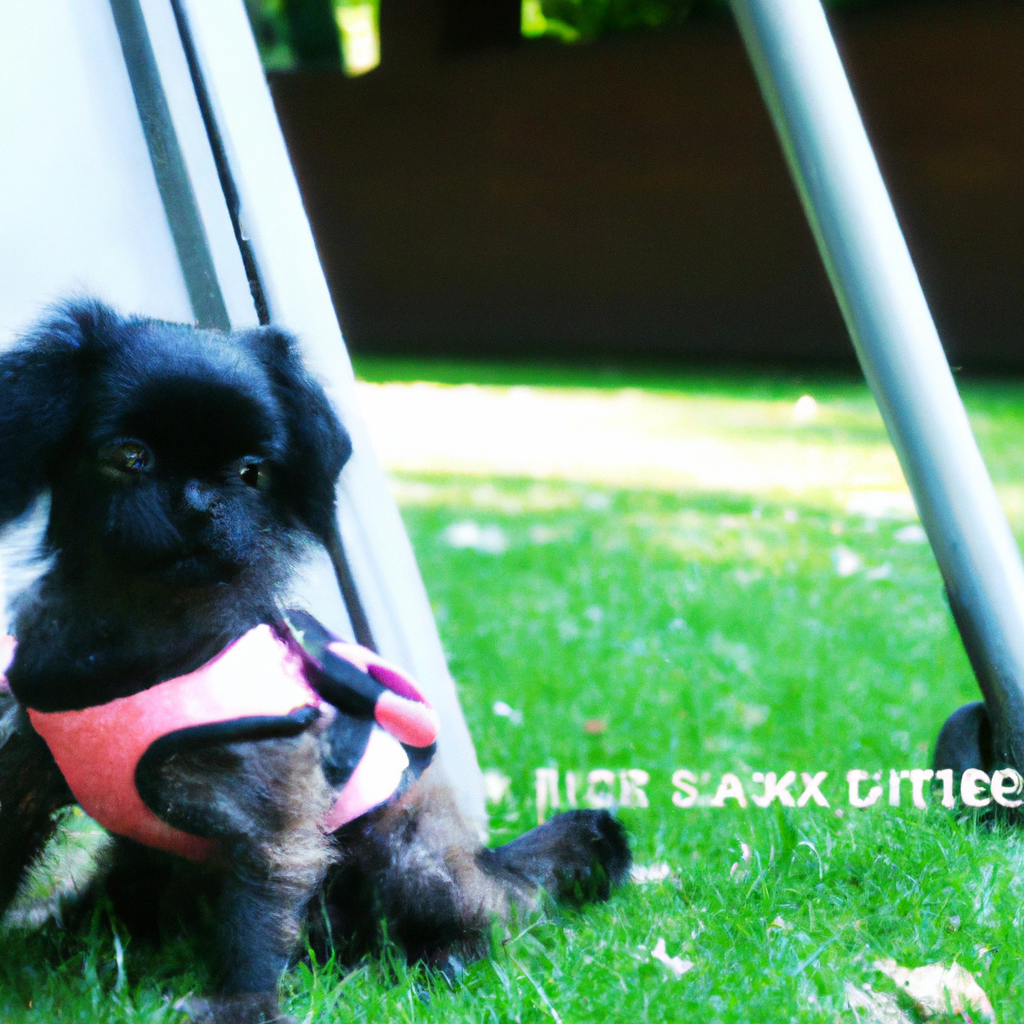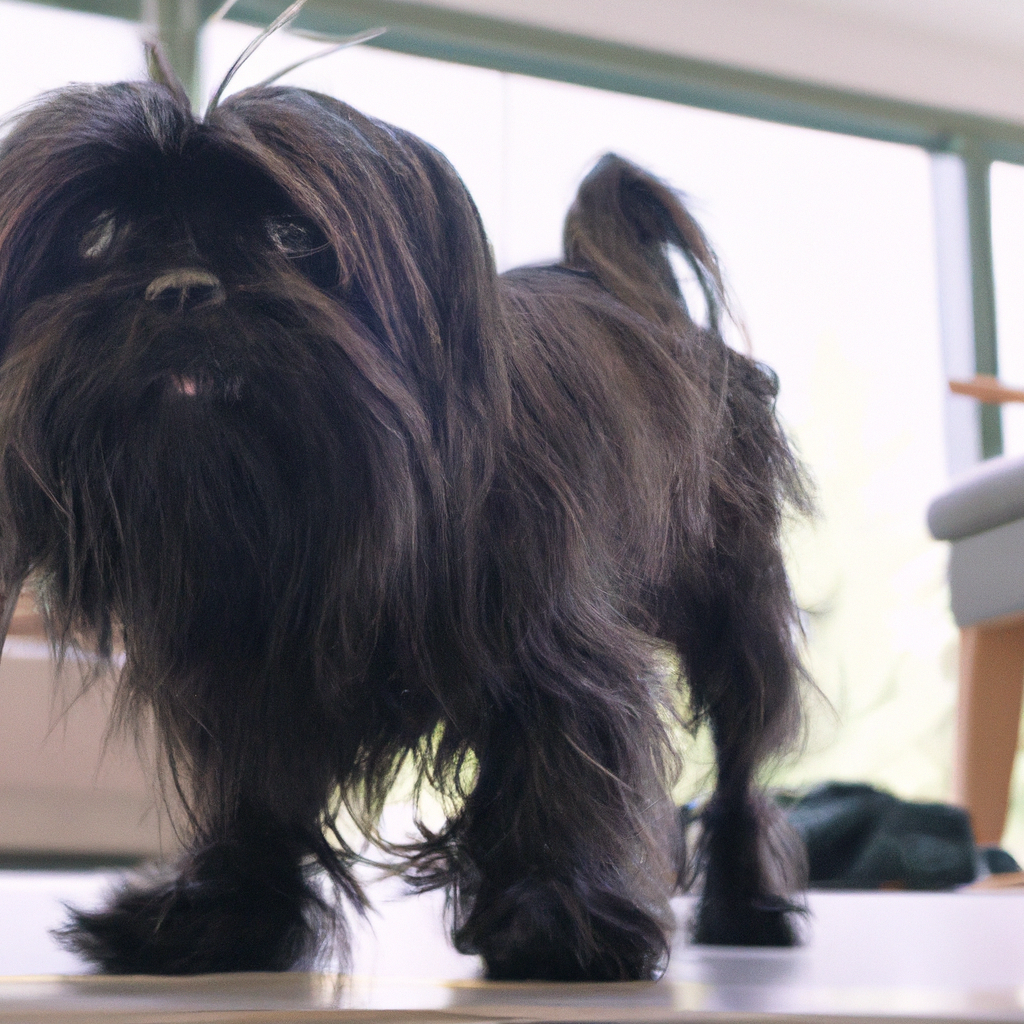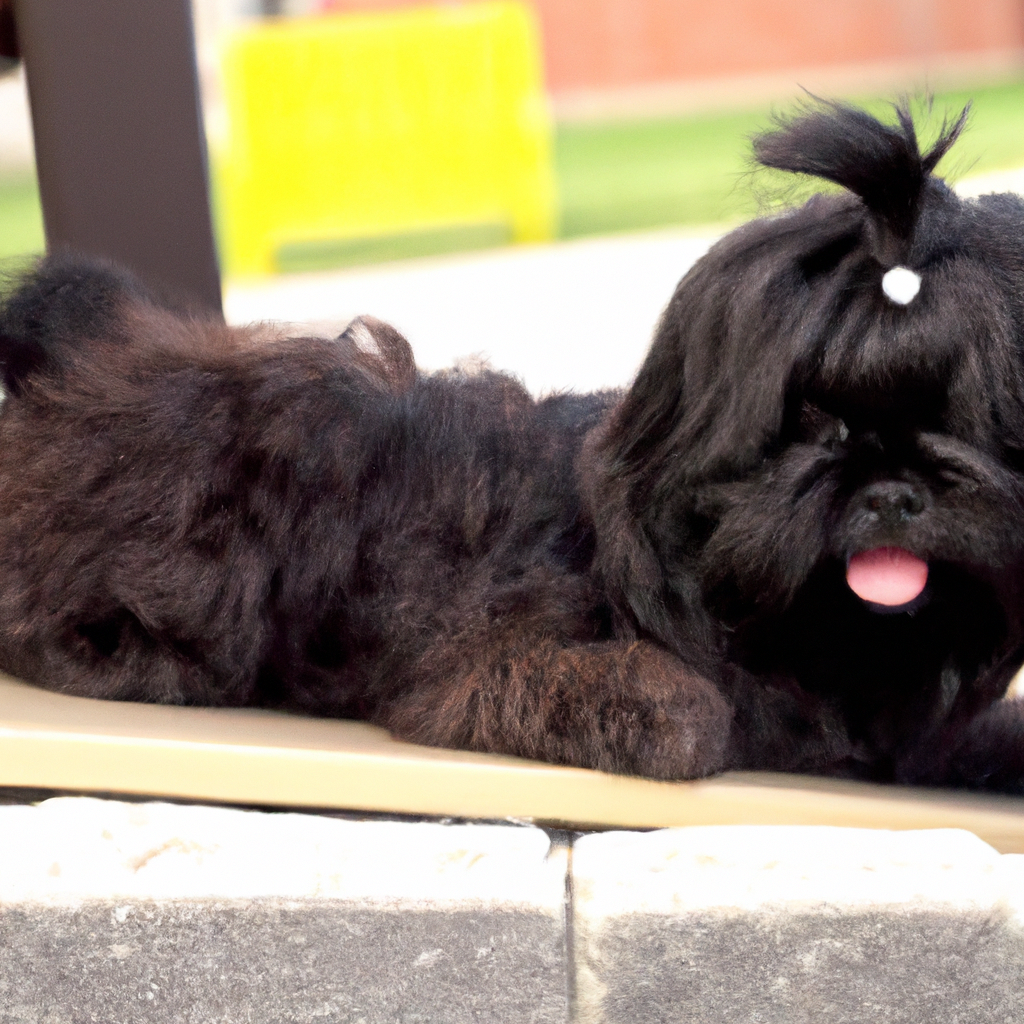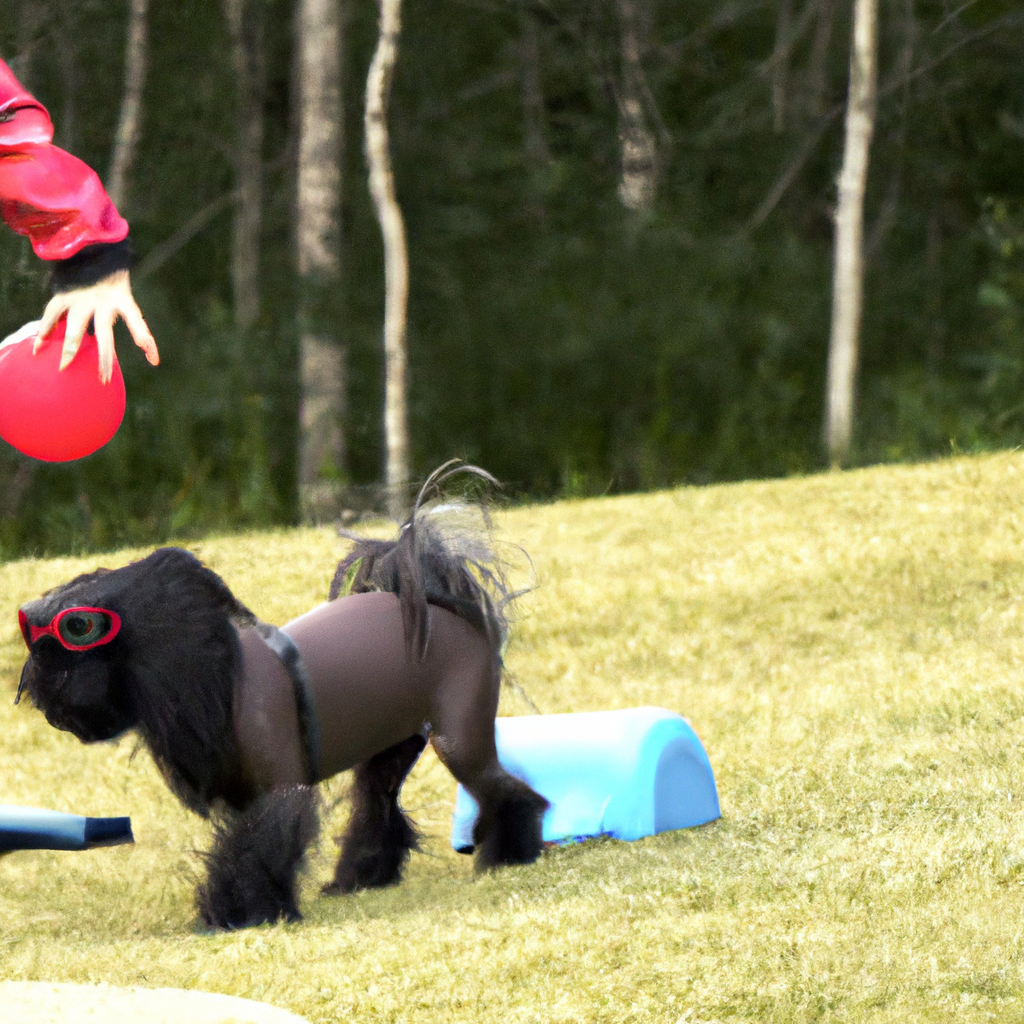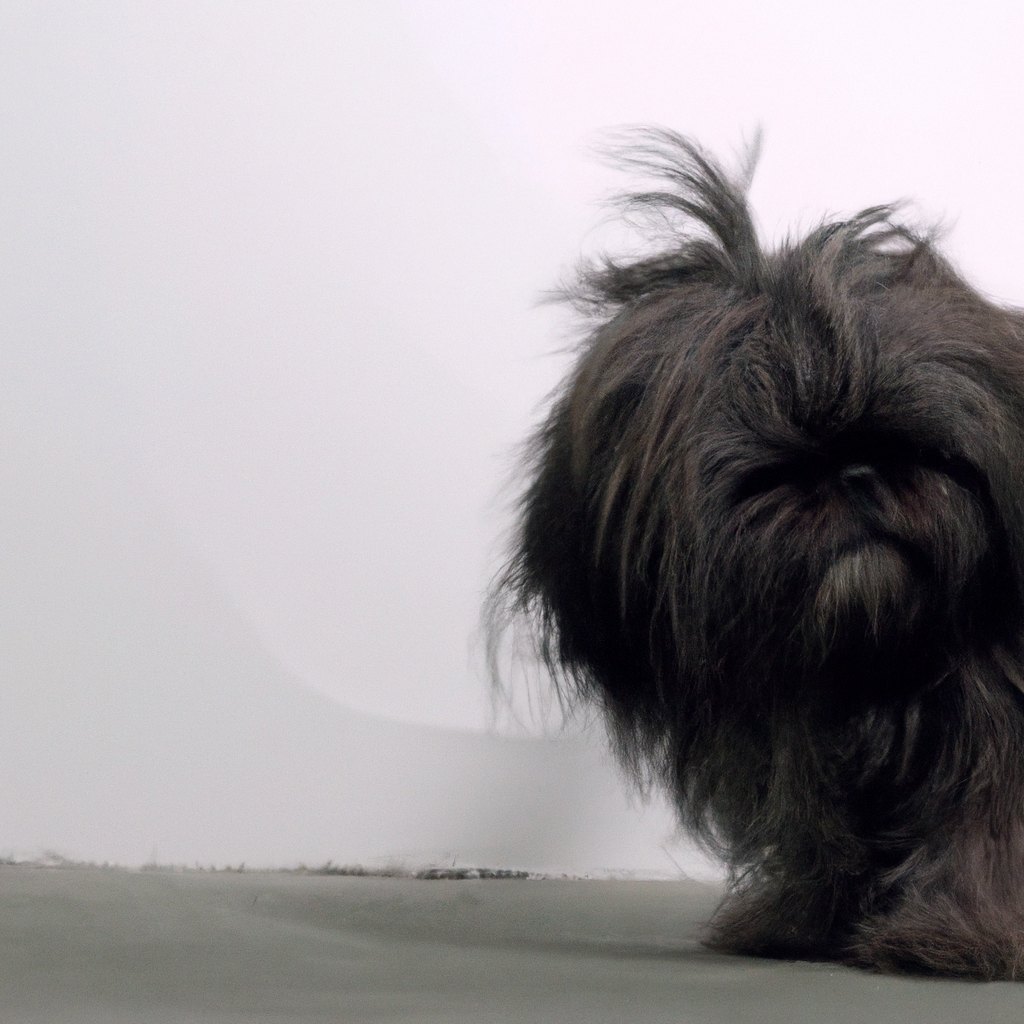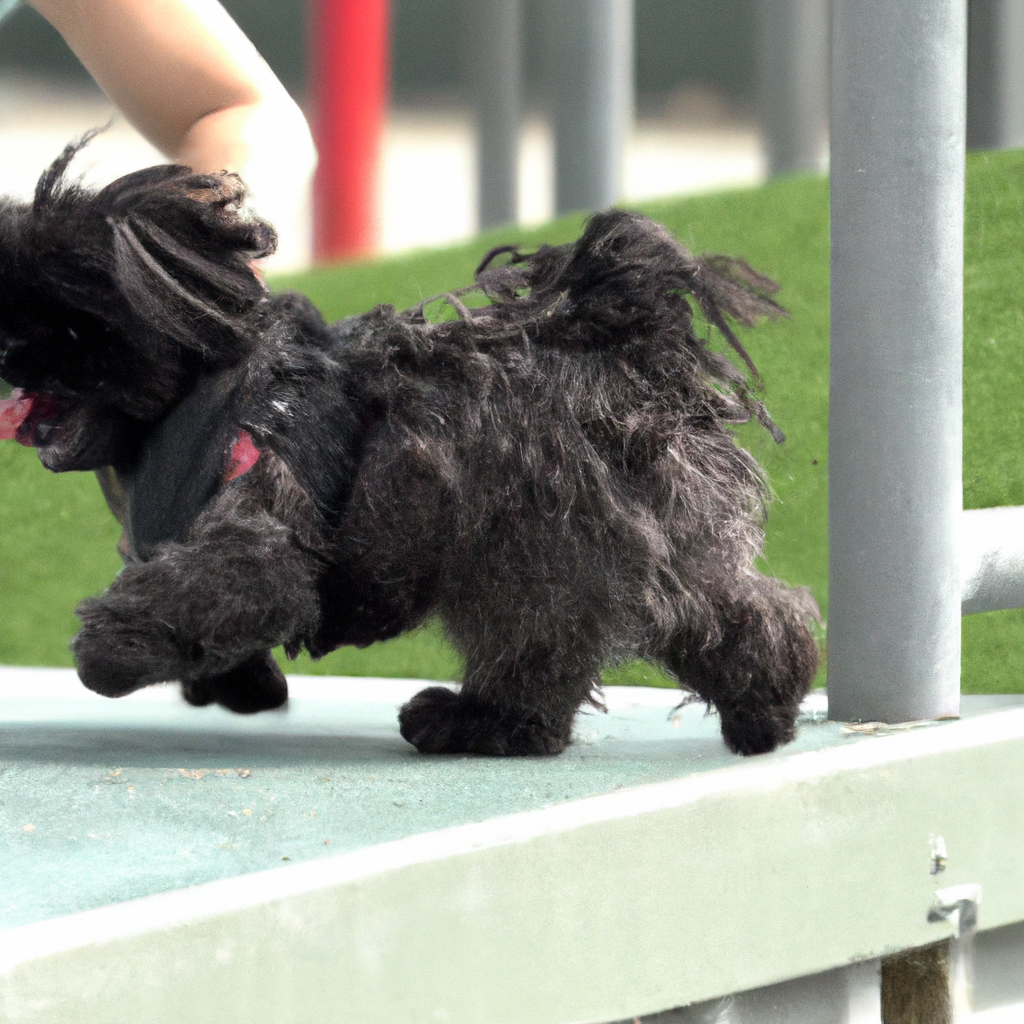Affenpinschers, also known as “Monkey Terriers”, are small, playful dogs known for their distinctive appearance and energetic personality. While they are generally friendly and sociable, children’s safety around Affenpinschers is an important consideration. Due to their small size and sometimes assertive nature, these dogs may not be suitable for very young or overly energetic children. It’s crucial to supervise interactions between children and Affenpinschers to ensure the safety of both parties. Teaching children how to approach and handle these dogs properly can also help prevent any potential accidents or injuries.
Understanding Affenpinschers: A Guide to Children’s Safety
Affenpinschers, often referred to as “Monkey Terriers” due to their distinct primate-like appearance, are small but sturdy dogs known for their playful and adventurous nature. They are a popular choice among dog lovers, especially families with children. However, like any other breed, understanding Affenpinschers and ensuring children’s safety around them is crucial.
Affenpinschers are generally friendly and sociable dogs. They are known for their loyalty and protective nature, which makes them excellent companions. However, they can also be quite assertive and territorial, especially when it comes to their food or toys. This is a trait that can potentially lead to issues if not properly managed, particularly in households with young children.
Children, especially toddlers, are naturally curious and may not understand the concept of personal space when it comes to pets. They might reach out to grab the dog’s toy or food, which could trigger a defensive response from an Affenpinscher. Therefore, it’s essential to teach children to respect the dog’s space and belongings.
Moreover, Affenpinschers, despite their small size, are quite energetic and can sometimes play rough. While this is usually harmless, it can potentially lead to accidental injuries, especially with smaller children who may not be as stable on their feet. Hence, it’s important to supervise playtime between children and Affenpinschers to ensure it doesn’t get too rough.
Another aspect to consider is the Affenpinscher’s strong instinct to chase. This breed was originally bred to hunt rats and other small vermin, and this instinct can sometimes kick in when they see small, fast-moving objects – like a running child. While this is usually in good fun, it can sometimes lead to accidental trips and falls. Therefore, teaching your Affenpinscher to obey commands like “stop” or “stay” can be very beneficial in preventing such incidents.
Despite these considerations, it’s important to remember that every Affenpinscher is an individual with its own personality and temperament. Some may be more laid-back and patient with children, while others may be more energetic and assertive. Therefore, it’s crucial to spend time getting to know your Affenpinscher and understanding its unique traits and behaviors.
In addition, it’s equally important to educate children on how to interact with dogs safely. Teach them not to pull the dog’s tail or ears, not to disturb the dog while it’s eating or sleeping, and to approach the dog slowly and gently. Encourage them to use soft voices and gentle touches, as loud noises and rough handling can startle the dog and potentially lead to defensive behavior.
In conclusion, Affenpinschers can make wonderful family pets, but like any breed, they require understanding and respect. By teaching children to interact safely with dogs and by understanding the Affenpinscher’s unique traits and instincts, you can ensure a safe and harmonious relationship between your children and your Affenpinscher. After all, the goal is to create a loving and safe environment for everyone in the family – two-legged and four-legged members alike.
Teaching Kids Safe Interaction with Affenpinschers
Affenpinschers, often referred to as “Monkey Terriers” due to their distinct, primate-like facial features, are small but sturdy dogs known for their playful and adventurous nature. While they make excellent companions, it’s essential to teach children how to interact safely with these spirited canines to ensure a harmonious relationship.
Firstly, it’s important to understand the Affenpinscher’s temperament. These dogs are known for their bold and stubborn nature, which can sometimes be mistaken for aggression. However, with proper socialization and training, they can be incredibly affectionate and protective of their human family. They are also known to be a bit territorial, which means they may not appreciate sudden invasions of their personal space.
This is where teaching children about safe interaction becomes crucial. Kids should be taught to approach the Affenpinscher slowly and calmly, without making any sudden movements that might startle the dog. It’s also important to instruct children not to pull on the dog’s ears or tail, as this can cause discomfort and potentially provoke a defensive reaction.
Another key point to remember is that Affenpinschers, like all dogs, communicate through body language. Encourage your child to observe the dog’s signals. For instance, if the Affenpinscher’s ears are back and its tail is tucked, it’s likely feeling scared or anxious. In such cases, it’s best to give the dog some space. On the other hand, a wagging tail and relaxed body usually indicate that the dog is comfortable and open to interaction.
Children should also be taught to respect the Affenpinscher’s possessions. This breed can be possessive about their toys and food, so it’s best to avoid taking these away from them. Instead, teach your child to engage the dog in a game of fetch or tug-of-war using a different toy. This not only ensures safety but also helps build a positive relationship between the child and the dog.
It’s equally important to supervise interactions between children and Affenpinschers, especially in the beginning. This allows you to step in if necessary and provides an opportunity to reinforce positive behavior. For instance, if your child is petting the dog gently and the Affenpinscher seems comfortable, praise both of them. This helps the child understand what appropriate interaction looks like and encourages the dog to associate the child’s presence with positive experiences.
Lastly, remember that every Affenpinscher is an individual with its own personality and preferences. Some may enjoy cuddling on the couch, while others might prefer playing fetch in the yard. Encourage your child to respect these preferences and interact with the dog in ways that it enjoys.
In conclusion, teaching children safe interaction with Affenpinschers involves understanding the breed’s temperament, respecting their personal space and possessions, observing their body language, and supervising interactions. With these guidelines in place, children and Affenpinschers can form a bond that is not only safe but also enriching for both parties. After all, the goal is to foster a relationship that brings joy and companionship to your child and their Affenpinscher friend.
Preventing Affenpinscher Bites: Safety Tips for Children
Affenpinschers, often referred to as “Monkey Terriers” due to their distinct primate-like appearance, are small but mighty dogs known for their playful and adventurous nature. While they make for great companions, it’s essential to understand how to ensure children’s safety around these spirited canines, particularly in preventing Affenpinscher bites.
Affenpinschers are generally friendly and sociable, but like any dog breed, they can become defensive if they feel threatened or scared. This is why it’s crucial to teach children how to interact with them properly. The first step in preventing Affenpinscher bites is to educate children about the importance of respecting the dog’s space. Kids should understand that dogs, like people, need their personal space and should not be disturbed when they’re eating, sleeping, or enjoying a favorite toy.
Another important lesson is teaching children how to approach an Affenpinscher, or any dog for that matter. It’s not advisable for a child to approach a dog head-on or make direct eye contact, as the dog might perceive this as a threat. Instead, children should approach dogs from the side and allow the dog to sniff their hand before petting them. This gives the dog a chance to get familiar with the child and reduces the likelihood of a defensive reaction.
Children should also be taught to understand a dog’s body language. Affenpinschers, like other dogs, communicate their feelings through their body language. A wagging tail doesn’t always mean a happy dog; it can also indicate nervousness or agitation. If an Affenpinscher shows signs of discomfort, such as growling, baring teeth, or a stiff body, it’s best for the child to slowly back away and give the dog some space.
It’s also important to supervise interactions between children and Affenpinschers, especially if they’re not used to each other. Even the most well-behaved child or dog can unintentionally provoke a reaction. By keeping a watchful eye, adults can intervene if necessary and prevent any potential mishaps.
While Affenpinschers are generally good with children, they’re better suited for families with older kids who understand how to handle them. These dogs are small and can be easily injured by rough play, so it’s important for children to learn how to play gently with them. Encourage games that don’t involve tugging or wrestling, as these can lead to accidental bites.
Lastly, it’s beneficial to socialize Affenpinschers from a young age. Exposing them to different people, environments, and situations can help them become more comfortable around children and less likely to react defensively. Regular training can also help manage any aggressive tendencies and reinforce positive behavior.
In conclusion, while Affenpinschers are charming and lively companions, it’s essential to take precautions to ensure children’s safety around them. By teaching children how to respect and understand these dogs, supervising their interactions, and promoting gentle play, we can prevent Affenpinscher bites and foster a harmonious relationship between them. Remember, a well-socialized and trained Affenpinscher is a joy to have around, and with the right approach, they can form a wonderful bond with children.
Affenpinschers and Kids: Establishing Safe Boundaries
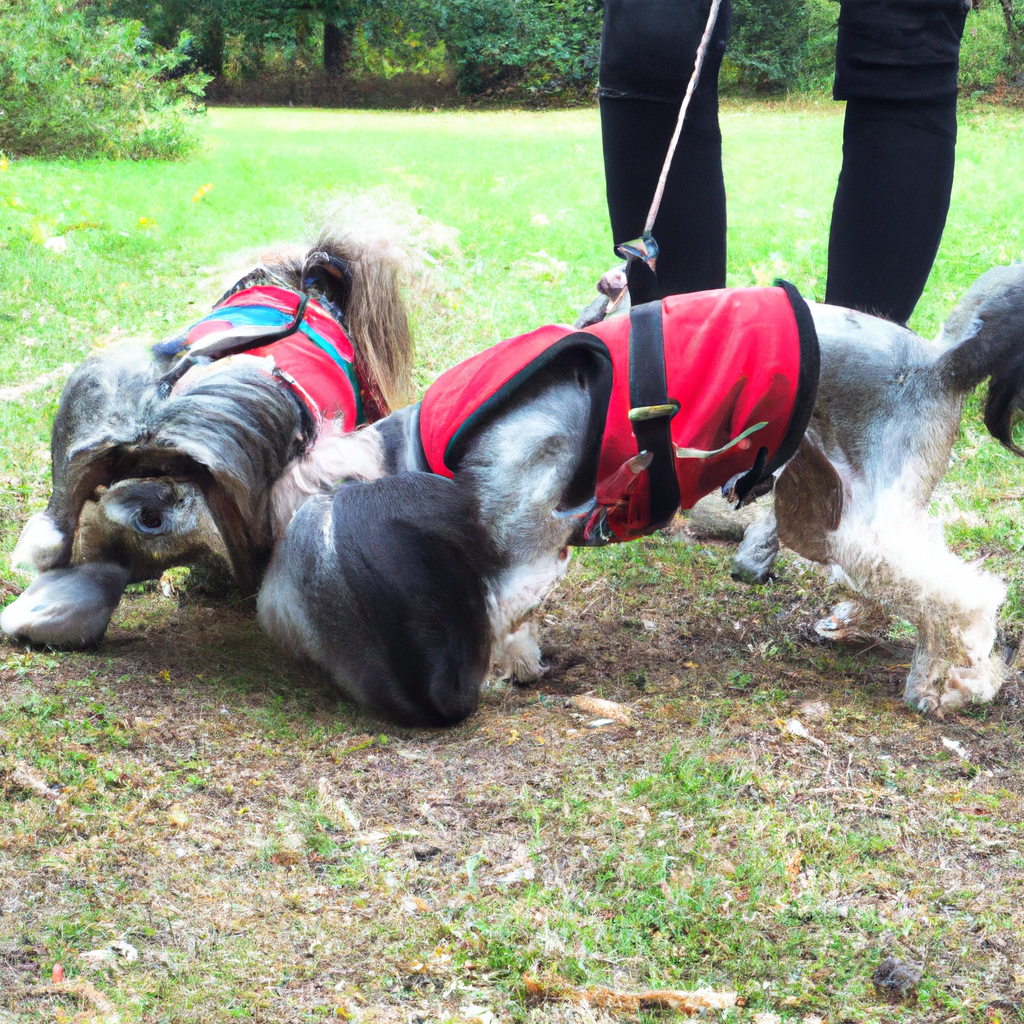
Affenpinschers, often referred to as “Monkey Terriers” due to their distinct primate-like appearance, are small but sturdy dogs known for their playful and adventurous nature. They are a popular choice among families, especially those with children. However, like any other breed, it’s crucial to establish safe boundaries between Affenpinschers and kids to ensure the safety and well-being of both parties.
Affenpinschers are generally friendly and sociable dogs. They are known for their loyalty and protective nature, which makes them excellent companions. However, they can also be quite assertive and stubborn at times. This trait, coupled with their small size, can sometimes lead to misunderstandings and potential safety issues when interacting with children.
Children, especially younger ones, often view pets as their playmates. They may not fully understand that their actions, such as pulling the dog’s tail or ears, can cause discomfort or even pain to the animal. Affenpinschers, despite their friendly nature, may react defensively when they feel threatened or hurt. Therefore, it’s essential to teach children how to interact with these dogs properly.
One of the first steps in establishing safe boundaries is educating children about the dog’s body language. Kids should understand that when an Affenpinscher growls, shows its teeth, or raises its fur, it’s a sign that the dog is uncomfortable and they should back off. It’s also important to teach children not to disturb the dog while it’s eating or sleeping, as these are times when the dog may be more likely to react negatively to being bothered.
Another crucial aspect of ensuring children’s safety around Affenpinschers is supervision. Never leave a young child alone with a dog, regardless of its breed. Even the most well-behaved dog can become unpredictable when provoked or scared. By supervising their interactions, you can step in if the play becomes too rough or if the dog shows signs of distress.
Training your Affenpinscher is also a key part of establishing safe boundaries. A well-trained dog is less likely to react aggressively if a child accidentally hurts it. Basic commands like “sit,” “stay,” and “leave it” can be particularly useful in managing the dog’s behavior around children. Remember, training should always be done using positive reinforcement methods, such as treats and praises, rather than punishment.
Lastly, it’s important to remember that every dog is an individual. Just like people, they have their own personalities, likes, and dislikes. Some Affenpinschers may naturally be more patient and tolerant with children, while others may prefer a quieter environment. Always consider your dog’s individual temperament when establishing boundaries and rules.
In conclusion, Affenpinschers can make wonderful family pets, but it’s essential to establish safe boundaries between these dogs and children. By educating kids about appropriate behavior, supervising their interactions, and training the dog, you can create a safe and harmonious environment for everyone. Remember, a well-informed and respectful approach to pet ownership can go a long way in ensuring the safety and happiness of both your children and your Affenpinscher.
Childproofing Your Home for Affenpinschers
Children’s safety around Affenpinschers is a topic that deserves our attention. Affenpinschers, also known as “Monkey Terriers,” are small, playful, and intelligent dogs that can make wonderful family pets. However, like any breed, they have their unique characteristics and needs that should be considered to ensure a safe and harmonious environment for both the children and the dog.
Firstly, it’s important to understand the nature of Affenpinschers. They are known for their bold and stubborn personality, which can sometimes lead to them being a bit territorial. This means that they might not always appreciate the unpredictable nature of young children who may not understand the concept of personal space. Therefore, it’s crucial to teach your children how to interact with the Affenpinscher appropriately. This includes showing them how to gently pet the dog and explaining that they should never disturb the dog while it’s eating or sleeping.
Next, let’s talk about childproofing your home for Affenpinschers. These dogs are small and agile, which means they can easily get into places they shouldn’t. They are also known for their curiosity and love for chewing, which can lead to them ingesting harmful substances or small objects. Therefore, it’s essential to keep things like cleaning supplies, medications, and small toys out of their reach.
Moreover, Affenpinschers are known for their high energy levels. They love to play and run around, which can sometimes lead to accidents if not properly supervised. Therefore, it’s a good idea to create a safe play area for your Affenpinscher where they can burn off their energy without the risk of getting hurt. This could be a fenced yard or a designated room in your house with plenty of toys and no dangerous objects.
Another important aspect of childproofing your home for Affenpinschers is ensuring that they have a quiet and comfortable place to retreat to when they need some alone time. This could be a dog bed in a quiet corner of the house or a crate that they can call their own. This will not only help your Affenpinscher feel more secure, but it will also teach your children about respecting the dog’s space.
Lastly, it’s important to remember that Affenpinschers, like all dogs, need regular exercise and mental stimulation to stay happy and healthy. This means that they should be taken for regular walks and given plenty of toys to play with. However, it’s also important to supervise these activities to ensure that they don’t lead to any accidents or injuries.
In conclusion, children’s safety around Affenpinschers largely depends on understanding the breed’s characteristics and needs, teaching your children how to interact with the dog appropriately, and childproofing your home to prevent accidents. By taking these steps, you can create a safe and harmonious environment for both your children and your Affenpinscher. Remember, a well-cared-for Affenpinscher is a happy Affenpinscher, and a happy Affenpinscher makes for a happy home.
How to Train Affenpinschers for Safe Play with Children
Affenpinschers, often referred to as “Monkey Terriers” due to their distinct primate-like appearance, are small but sturdy dogs known for their playful and adventurous nature. While they make excellent companions, it’s crucial to ensure children’s safety around Affenpinschers. This involves training the dog for safe play with children, which can be a rewarding experience when done correctly.
Affenpinschers are naturally protective and can be a bit territorial, which can sometimes lead to misunderstandings with children. However, with the right training, these dogs can learn to interact safely and enjoyably with the younger members of the family. The key is to start training early, ideally when the Affenpinscher is still a puppy. This is when they are most receptive to learning new behaviors and habits.
The first step in training an Affenpinscher for safe play with children is to socialize the dog. This means exposing the dog to a variety of people, environments, and situations. The more experiences your Affenpinscher has, the more comfortable they will be around children. This can be as simple as taking your dog to the park, inviting friends over, or enrolling them in a puppy socialization class.
Next, it’s important to teach your Affenpinscher to be gentle. This can be done through a variety of training techniques, such as positive reinforcement. For example, if your dog plays gently, reward them with a treat or praise. If they play too roughly, calmly remove them from the situation and give them a time-out. Over time, your Affenpinscher will learn that gentle play is rewarded, while rough play leads to a loss of playtime.
Another crucial aspect of training is teaching your Affenpinscher to understand and respect boundaries. This can be particularly important when it comes to children’s toys. Affenpinschers are naturally curious and may be tempted to chew on or play with children’s toys. However, this can lead to accidents or damage. To prevent this, teach your dog which toys are theirs and which are off-limits. This can be done by consistently rewarding them for playing with their own toys and redirecting them when they show interest in children’s toys.
Finally, it’s important to involve your children in the training process. This not only helps the Affenpinscher get used to being around children but also teaches the children how to interact safely with the dog. Children should be taught to respect the dog’s space, to play gently, and to understand the dog’s body language. This mutual respect and understanding can go a long way in ensuring safe and enjoyable interactions between your Affenpinscher and your children.
In conclusion, training an Affenpinscher for safe play with children involves socialization, teaching gentleness and boundaries, and involving the children in the training process. With patience, consistency, and positive reinforcement, your Affenpinscher can learn to interact safely and happily with the younger members of your family. Remember, every dog is unique and may require different training techniques. If you’re struggling with training, don’t hesitate to seek help from a professional dog trainer. After all, the safety and happiness of both your children and your Affenpinscher are worth the effort.
The Role of Supervision in Ensuring Children’s Safety Around Affenpinschers
Affenpinschers, often referred to as “Monkey Terriers” due to their distinct, primate-like facial features, are small but sturdy dogs known for their playful and adventurous nature. They are generally good with children and can make excellent family pets. However, like with any breed, ensuring children’s safety around Affenpinschers requires a certain level of supervision and understanding of the breed’s characteristics.
Affenpinschers are known for their bold and sometimes stubborn nature. They are curious and energetic, which can sometimes lead to unpredictable behavior. This is not to say that they are dangerous, but rather that their playful antics can sometimes get out of hand, especially when they are around young children. Therefore, it is crucial for adults to supervise interactions between children and Affenpinschers to ensure safety for both parties.
One of the key aspects of supervision is teaching children how to interact with the dog. Children should be taught to approach the dog calmly and gently, avoiding sudden movements that might startle the dog. They should also be taught not to pull on the dog’s ears or tail, as this can cause discomfort and potentially lead to a defensive reaction from the dog. It’s also important to teach children not to disturb the dog while it’s eating or sleeping, as this can also lead to unwanted reactions.
In addition to teaching children how to behave around the dog, it’s also important for adults to understand the dog’s behavior. Affenpinschers, like many small breeds, can be somewhat territorial and protective of their space. They may not react well to being crowded or handled roughly, especially by someone they are not familiar with. Therefore, it’s important for adults to monitor the dog’s body language and intervene if they see signs of discomfort or agitation.
Another important aspect of supervision is ensuring that the dog is properly trained. Affenpinschers are intelligent and can be trained to follow commands, which can be helpful in managing their behavior around children. Training should be consistent and positive, focusing on rewarding good behavior rather than punishing bad behavior. This can help to build a strong bond between the dog and the family, making it easier to manage interactions between the dog and children.
Finally, it’s important to remember that every dog is an individual, and not all Affenpinschers will behave in the same way. Some may be more tolerant of children, while others may be more reserved. It’s important to take the time to get to know the dog and understand its individual personality and temperament. This can help to predict how the dog might react in different situations and allow for better management of interactions between the dog and children.
In conclusion, while Affenpinschers can make wonderful family pets, ensuring children’s safety around these dogs requires a certain level of supervision. This includes teaching children how to interact with the dog, understanding the dog’s behavior, ensuring that the dog is properly trained, and getting to know the dog’s individual personality and temperament. With these measures in place, families can enjoy the company of an Affenpinscher while ensuring the safety of both the children and the dog.
Creating a Safe Environment for Children and Affenpinschers
Affenpinschers, often referred to as “Monkey Terriers” due to their distinct primate-like appearance, are small but sturdy dogs known for their playful and adventurous nature. They are a popular choice for families, but like any pet, it’s essential to ensure a safe environment for both the children and the Affenpinschers.
Creating a safe environment begins with understanding the breed’s characteristics. Affenpinschers are known for their bold and stubborn nature, which can sometimes lead to them being a little too playful or assertive. They are also very protective, which can be a great trait, but it also means they can sometimes be a little too defensive if they feel their territory is being threatened.
To ensure a harmonious relationship between your children and your Affenpinscher, it’s crucial to teach your children how to interact with the dog properly. Children should be taught to respect the dog’s space, especially when it’s eating or sleeping. They should also be taught not to pull on the dog’s ears or tail, as this can cause the dog to become defensive and potentially snap.
It’s also important to supervise interactions between your children and the Affenpinscher, especially when they are still getting to know each other. This will allow you to intervene if the play gets too rough or if the dog starts to show signs of stress or discomfort. Remember, Affenpinschers are small dogs, and while they are sturdy, they can still be injured by rough play.
Training your Affenpinscher is another key aspect of creating a safe environment. Affenpinschers are intelligent dogs and can be trained to follow commands, which can be useful in managing their behavior around children. Training should be consistent and positive, focusing on rewarding good behavior rather than punishing bad behavior.
Socialization is also crucial for Affenpinschers. Exposing them to different people, environments, and situations can help them become more comfortable around children and less likely to react negatively to unexpected situations.
In addition to these measures, it’s also important to ensure that your Affenpinscher has a safe space in your home where it can retreat if it feels overwhelmed. This could be a crate or a specific room in the house. This space should be respected by all members of the family, including children.
Lastly, remember that every dog is an individual, and what works for one Affenpinscher may not work for another. It’s important to pay attention to your dog’s signals and adjust your approach as needed. If you’re struggling to create a safe environment, don’t hesitate to seek help from a professional dog trainer or behaviorist.
In conclusion, creating a safe environment for children and Affenpinschers involves understanding the breed’s characteristics, teaching children how to interact with the dog, supervising interactions, training the dog, socializing the dog, and providing a safe space for the dog in your home. With these measures in place, your children and your Affenpinscher can form a strong, safe, and loving bond.In conclusion, Affenpinschers, like any other dogs, can pose potential risks to children if not properly trained or supervised. However, they are generally known for their friendly and protective nature. It is crucial to educate children on how to interact with them safely and respectfully. Regular monitoring and proper introduction of the dog to the child can ensure a safe environment.
